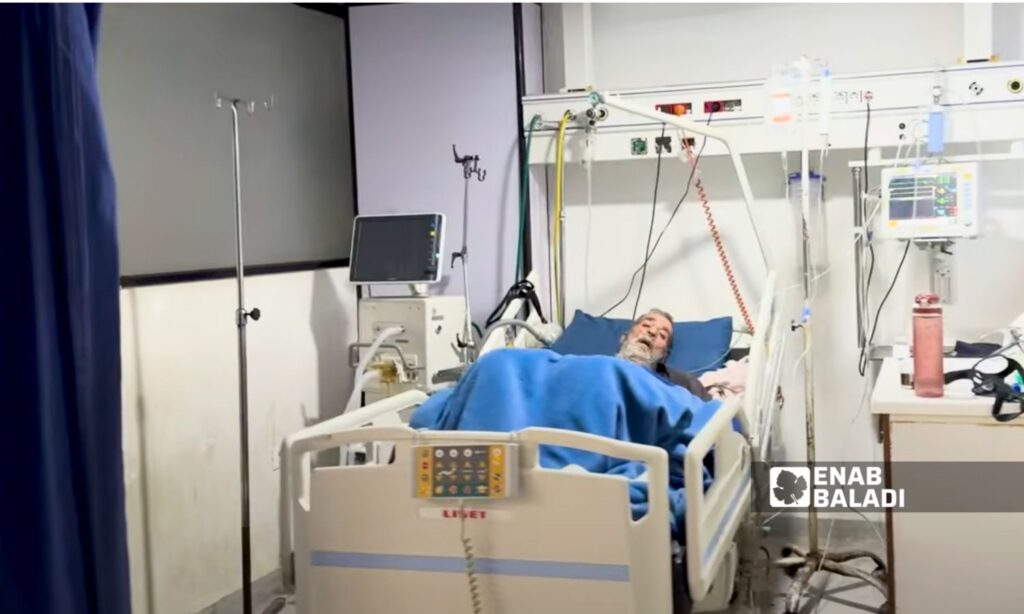The al-Mujtahid and al-Mouwasat hospitals in Damascus have been experiencing a severe shortage of essential daily medical supplies and consumables for several weeks.
This situation causes numerous daily problems and disputes between families and doctors, pushing families to secure even the smallest medical supplies like syringes and IV sets themselves.
Mohammad al-Halbouni, Director of al-Mujtahid Hospital, told Enab Baladi, “The high number of patients that the al-Mujtahid emergency department receives daily does not match the number of consumables available.”
The emergency departments of al-Mujtahid and al-Mouwasat hospitals are the primary destinations for patients from Damascus and its countryside, in addition to some patients coming from the eastern provinces.
According to al-Halbouni, since the fall of the regime on December 8, 2024, most supplies depend heavily on aid, charitable organizations, and personal initiatives.
Al-Mujtahid Hospital receives, according to its officials, between 500 to 600 emergency cases per day, with the number sometimes reaching 900 cases on certain days.
The most frequently treated cases include respiratory epidemics, traffic accidents, explosive injuries, gunshot wounds, burn injuries, withdrawal symptoms from narcotics, liver cirrhosis, and diabetes.
Chaos following the regime’s collapse
The chaos following the rapid collapse of the regime in Damascus, along with injuries from stray bullets, placed immense pressure on the hospitals.
As the number of patients increased, the medical staff in the emergency department found themselves forced to prioritize cases, deciding to treat the most critical cases first, followed by those with moderate and then less severe conditions.
According to al-Halbouni, cold operations nearly ceased, were it not for personal efforts and some contributions from families and charitable organizations, and the hospital still faces this danger.
Al-Halbouni believes that many cases are caused by recklessness and a lack of awareness, especially concerning motorcycle accidents and incidents involving explosives.
The hospital director appealed to families and government entities through Enab Baladi to monitor young teenagers, particularly regarding weapons and motorcycle use.
No one realizes the size of the catastrophe
Doctors face numerous disturbances every day, and sometimes are subjected to insults and physical assaults from the patients’ escorts, as reported by several doctors, due to negligence and lack of interest in patients, according to the families.
Shaam Attaya, a doctor in the emergency and intensive care section at al-Mujtahid Hospital, told Enab Baladi, “There is some negligence, this is true, but the problem does not relate to medical competencies, but to many issues beyond our control. More than half of the medical devices are out of order, and many supplies are unavailable.”
The doctors’ working hours have doubled compared to the times during al-Assad’s regime due to significant pressure and shortages that have also affected the workforce, but no one seems to understand that, according to the doctor.
She added that most disputes with patients’ escorts arise when they are requested to bring drugs or supplies from outside or when they are informed that only a limited number of escorts can be at a patient’s side.
According to Attaya, most medical staff have exhausted their capabilities due to fatigue and exhaustion.
The shortage is not new
The lack of support during the previous regime, combined with many dilapidated or non-functional devices and the unavailability of medications, has intensified the crisis.
Abdul Rahman Aaq Beik, head of the rapid response team at al-Mouwasat University Hospital, told Enab Baladi that the shortage is not new and existed since the days of the previous regime, but it has increased after the fall.
Aaq Beik clarified that this shortage is due to mismanagement of the medical supply stocks and essential materials during the previous regime, coupled with a long history of theft and looting over the past years.
The rapid response team
In the first hours after the regime’s collapse, the Rapid Response Team was established by a group of doctors at al-Mouwasat Hospital.
The team managed the hospital’s affairs and contributed to its medical and administrative operations until the team’s dissolution a few days ago.
More than 21,000 patients benefiting from the central emergency department, internal and surgical emergencies, and outpatient clinic services have received help from the team.
Additionally, the team provided logistical support and missing materials that helped perform more than 800 surgical operations, 300 of which were emergency surgeries due to instances of random gunfire during this time.
The team also secured fuel for transportation buses used by doctors and nurses to reach the hospital, with assistance from several families and the Arab International University (AIU).
One of the medical rooms in al-Mujtahid Hospital in Damascus – January 12, 2025 (Enab Baladi/Anas al-Khouli)
Need for immediate intervention and solutions
Despite ongoing efforts and continuous endeavors, most official reports anticipate that the health sector will not recover soon.
Figures indicate that the situation, especially in terms of food service, requires more than just personal initiatives and charities.
Therefore, the administrations of al-Mujtahid and al-Mouwasat hospitals have contacted the relevant authorities to ensure the return of government supply through regular channels.

